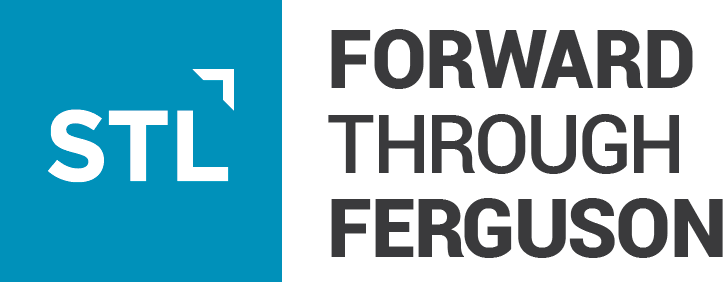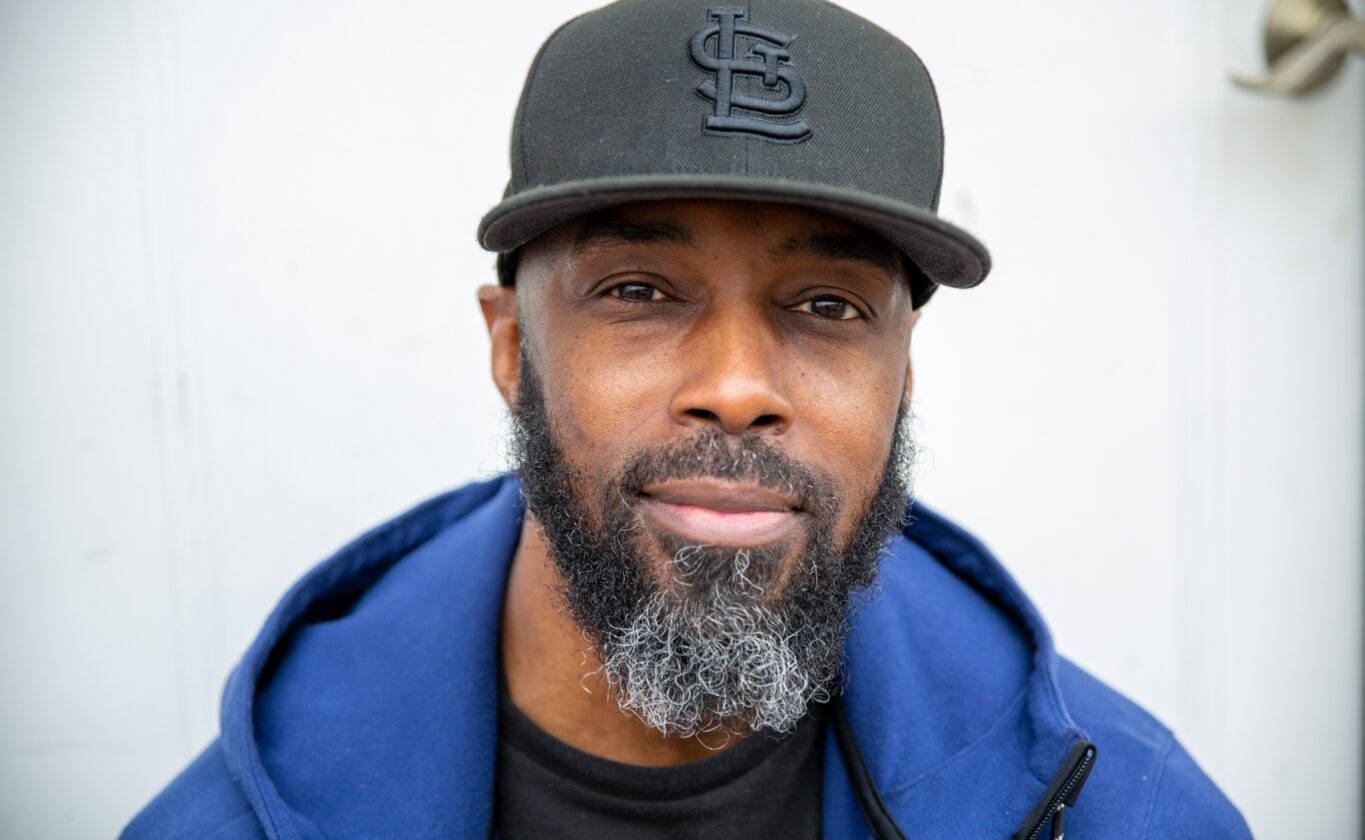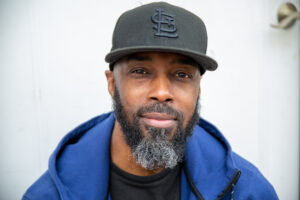
Photo credit: Colleen O’Connell Smyth / Humans of St. Louis
Ronnie: When I think of 911, I think of my experiences as a child. It was not an option to call because of police overreactions when they came upon a scene. We knew it was likely that someone was going to get hurt or locked up. My own mother got roughed up by the police. There are other times when you call for an emergency, like a fire or car crash, and no one shows up. But one time I remember a big story about a white man named Charles Stuart who called the police saying he and his pregnant wife were shot by an African American man driving through the Mission Hill Projects in Boston. His wife died and the baby survived. It later came to light that he was the one who shot his wife for the insurance money. But the response from the police was akin to soldiers raiding a village in Iraq. They came in kicking doors down, no warrants, dragging Black men down. I remember how Black boys felt at that time — unseen and helpless. And the city had the police’s back like they could do whatever they wanted with no repercussions. They would stop you, make you get on the ground on your knees, cross your legs, and pull down your pants for no reason but to humiliate you. Those were my earliest memories and interactions with the police and those have shaped my attitude.
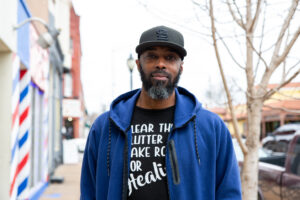
When I was 18, I was a victim of a gunshot wound to the face. I was with three of my friends, ready to go out on the town to celebrate a birthday. We were at a house waiting on the fourth guy to show up. I was wearing one of those chains that the old rappers used to wear and felt fly in my clothes, so I told one of the guys, ‘Let’s ride around for a bit.’ There was a girl I wanted to impress and we drove to her cousin’s house to look for her. It was one of those hangout houses in the neighborhood so there were always people there. When I arrived, two people were standing in the yard. I went into the house and came back down the stairs to leave after learning that she wasn’t around. As I was walking out the gate, one of the guys reached from behind and grabbed my chain. I turned around to see a gun in my face. I put my arm up to block it, and he pulled the trigger.
I was privy to a lot of violence growing up. So I heard about people being robbed, people doing the robbing, and people being shot. You hear stories and internalize them. When it happened to me, I understood what was going on and what I needed to do to survive. I was thinking, ‘Do I run and chance that he shoots me in the back, or do I fall to the ground and hope to survive?’ I made a split-second decision to fall down. They took the jewelry off my neck, reached in my pocket, and grabbed my money. He popped off some more shots but missed me by the grace of God. The guy I was with drove off, leaving me by myself.
When the robbers left, I ran up to the house but the occupants were unsympathetic. I felt uncomfortable, so I ran around the corner to look for help. The first place I came upon was a liquor store. I went inside and there were two clerks, both female. I asked one of them to call an ambulance. She asked why, so I dropped my hand to expose the wound on my face. She screamed. The other woman assured me that they were calling 911. It might have felt longer than it actually was waiting for them to arrive because it was a cold night in January, but it felt like forever.
The ambulance arrived first. As the medics lowered me onto the gurney, the police showed up. They were asking me things like, ‘Are you in a gang?’ The line of questioning was harsh and I felt as if they were treating me like a suspect. There I was, the victim of a crime, bleeding profusely out of my face and they interrogated me, acting like I created the situation. I felt diminished. They were just going through the motions of doing their job and were not concerned about my well-being. The cops called a few days later with more questions and, to be honest, I didn’t cooperate. I don’t know if I would have cooperated ever. I’ve never trusted the police because of how I’ve been treated my whole life. You hear things and everything I heard was validated by my own experiences.
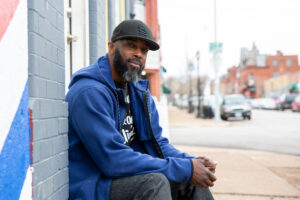
It’s important we don’t sugarcoat any of our issues in St. Louis. We know the effect racism has had on our communities — how we interact with one another. First, we have to acknowledge our history, which includes slavery and racism. After that, we have to acknowledge the systems impacted by that history: the carceral system, the justice system, how we educate our children, how people get affordable homes and good jobs. There are individuals who pledge to work toward correcting the conditions of our community, but unfortunately many are motivated by their own aspirations and ideologies, and not the benefit of the whole. If we functioned as a community, many issues could be addressed. If the powers that be really had an interest in the safety of our community they would show it in their investments.
I was privileged to sit in on a Board of Alderman (BOA) meeting where they were discussing a proposed bill to allot the police almost $6 million to renovate an elevator, attend to some cosmetic issues in the police academy, and purchase new police vehicles. In that meeting, the public testimony was overwhelmingly against it. Yet, the BOA voted to push it through to the next phase. It’s so reflective of business as usual and not reflective of the values of the people. We are choosing to invest in a system that has not been working. If over half of St. Louis City’s budget goes to the carceral system, then something is the matter when we’re still experiencing high levels of crime. Something else needs to happen to address crime, harm, and violence because it’s apparent our public officials aren’t listening.
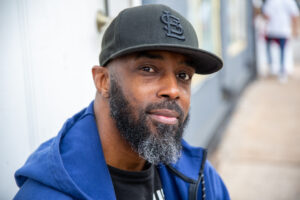
We don’t have enough responders and those we do have are underpaid and underappreciated. What we need is a whole network of first responders equipped to deal with crises better than the police. The police shouldn’t always be the option. They shouldn’t have to show up with a dispute between spouses or an unruly child in school. They shouldn’t show up when there is someone having a mental break and needs help. They shouldn’t show up when there is someone who is homeless. There need to be more options. Humanity and common sense need to be a part of the equation when we talk about responding in a really real way.
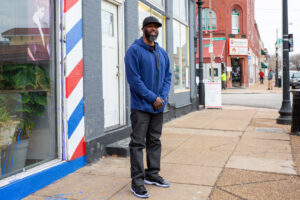
There is a quote attributed to Shirley Chisholm: ‘Service is the rent we pay for the privilege of living on this earth.’ I’m committed to my social responsibility to St. Louis, but it has taken a long time for me to get to that point. When I was 19, I went to prison. There were older men there who wanted to atone for their missteps, so they chose to guide and mentor the young men coming in. I was fortunate to be one of them. Those men taught me how to be an upstanding, healthy, decent individual who could go back out and make positive contributions to his family unit and community. In honor of those who spent so much time and energy to mold me into the man I am today, I do the work.
Since then, I’ve become a Power Builder Organizer with Freedom Community Center, a Black-led organization centered on the Northside of St. Louis and focused on reimagining safety. We have two basic strategies — peacemaking and power building. When we talk about power building, we talk about having each other’s best interests at heart. We believe people closest to the problem are closest to the solution. People outside of the community shouldn’t have a say in how we handle affairs. Power is the ability to get your needs met and do a task. We want to empower people to have a say and take control over who determines the resources of our community.
—
Ronnie Amiyn is a Power Builder Organizer at Freedom Community Center. Freedom Community Center (FCC) is a Black-led organization in North St. Louis founded to dismantle systems of oppression that inflict harm and trauma on Black communities in St. Louis City, particularly the police and the criminal punishment system.
Cami Thomas / My Friends And I and Colleen O’Connell Smyth / Humans of St. Louis contributed to this photo story.
This story is a collaboration between Humans of St. Louis and Forward Through Ferguson for #Transforming911, an accountability and advocacy tool that examines St. Louis’ 911 system and serves as a call to reimagine public safety.
Learn more and get involved at transforming911.org.
